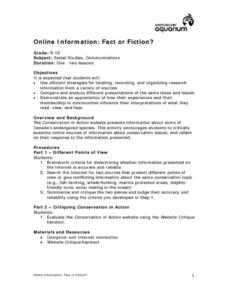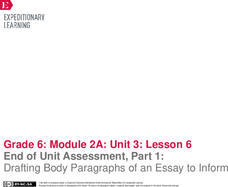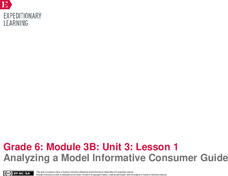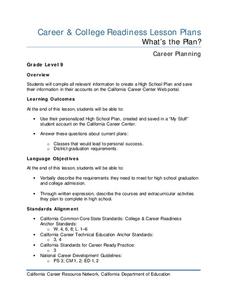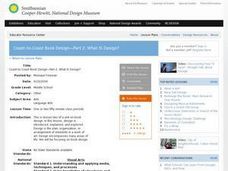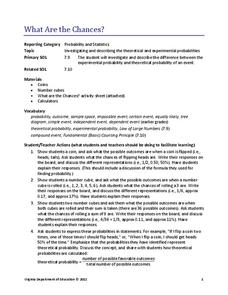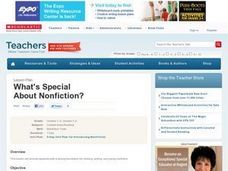PBS
What Is Newsworthy?
What is news? What is newsworthy? Who decides and what criteria do they use? Introduce young journalists to the basics of reporting with this media literacy lesson.
Curated OER
Gathering, Evaluating,and Organizing Information for a Research Report
It's never too early to build research skills! Students locate information relevant to a subject they are doing a research project on. They take notes and sort the information under main topic headings. Through research, they gain an...
Curated OER
What Was That All About?
Through direct instruction, the teacher demonstrates how to identify the main idea and supporting details of a text when creating a summary. As a class, read a paragraph, highlighting relevant information and crossing out extraneous...
Curated OER
Online Information: Fact or Fiction
Discuss ways to determine if the information middle and high schoolers gather online is accurate. Using the Internet, they cite two sources that show conflicting points of view on a subtopic of conservation. They summarize and analyze...
Teach Engineering
What's Wrong with the Coordinates at the North Pole?
Here is an activity that merges technology with life skills as individuals use Google Earth to explore the differences between coordinate systems and map projections. The self-guided worksheet is the fourth segment in a nine-part unit....
EngageNY
Research: Paraphrasing Relevant Information
Readers take a look at the source Ethical Style: How Is My T-Shirt Made? and discuss how to say the information in the article without plagiarism. Learners make note of and underline sentences that may present a problem in paraphrasing....
EngageNY
Research Tasks: New Words, Relevant Information, Revision
Word builders. Scholars participate in a mini lesson about affixes. They then complete a research vocabulary organizer and share their definitions of the words with the class. They gather more evidence for their research from the...
NOAA
What Little Herc Saw
See the underwater world through a different pair of eyes! Middle school marine biologists identify deep-sea organisms by examining images taken by an ROV from the Okeanos Explorer. After determining what creatures lie beneath the...
Curated OER
What's In Your Bag?
Guess what is in the bag! Use this lesson at the beginning of the year to discuss appropriate items for 4th grade students to have in school. Each group develops a list of appropriate items as well as inappropriate items, and discusses...
Odell Education
Reading Closely For Textual Details: Grade 8
Only a thorough understanding of history can save us from repeating it. Practice close reading skills with an eighth grade unit that focuses on 19th century America, including European immigration into Ellis Island and Frederick...
EngageNY
End of Unit Assessment, Part 1: Drafting Body Paragraphs of an Essay to Inform
Anybody can write a body paragraph! Pupils analyze the development of ideas in a body paragraph from a model essay. Next, using what they've learned, they draft the body paragraphs of their My Rule to Live By informative essay.
EngageNY
Analyzing a Model Informative Consumer Guide
What do consumers need to know about overfishing before buying fish? Scholars consider the question as they prepare for their performance task, which is to create a consumer guide for people about purchasing fish responsibly. After...
EngageNY
Using Informational Text Features and Learning Freaky Frog Vocabulary
What kind of text features help children build a strong vocabulary? Class members use text features such as headers to unpack new vocabulary words. They create vocabulary journals in which they will write what they think the definition...
California Department of Education
What’s the Plan?
What classes should pupils take to achieve their college and career goals? Explore the options through a lesson designed with the future in mind. Fifth in a series of six college and career readiness lesson plans, the activity challenges...
Federal Reserve Bank
The Rising Cost of College: Tuition, Financial Aid, and Price Discrimination
Are average college tuition and fees really rising in the United States? Here is a fascinating take on the rising cost of college tuition and how price discrimination may explain what is often seen as an insurmountable cost for higher...
New York City Department of Education
Grade K Literacy in Social Studies: Thinking About Families
Family is a wonderful subject for little learners to get excited about. Family is also the theme for a social studies unit that uses literacy standards throughout. The guide outlines approximately three weeks of instruction and breaks...
Curated OER
Coast-to-Coast Book Design -Part 2: What is Design?
Students explore the concept of design, and identify items in their lives that have been designed. They explore the concept of book design and create and arrange their own page layout.
Virginia Department of Education
What Are the Chances?
Take a chance on an informative resource. Scholars conduct probability experiments involving coins and number cubes to generate data. Compiling class data helps connect experimental probability to theoretical probability.
Curated OER
Add Tens
Learners solve six story problems about adding 10s. Provide 10-rods or objects they can group into 10s to visualize what is being asked. Two of the problems provide irrelevant information; with discussion and guidance, this is also a...
Curated OER
Only the Facts
Practice the strategy of summarizing to gain meaning and knowledge from an informational text. Young readers highlight supporting details and main ideas, and then they use this to summarize two articles: "The Great Quake" and "What is an...
Illustrative Mathematics
How Thick Is a Soda Can II?
Science, technology, and math come together in this one combination exercise. Analyzing the common soda can from both a purely mathematical perspective and a scientific angle allows for a surprisingly sophisticated comparison of...
Indiana University Libraries
Web Page Evaluation
Invite your learners to research three different websites that pertain to a topic focused on in your syllabus. Students fill out a chart by answering questions about each site. Then, they compare how useful the sites are to one another....
Missouri Department of Elementary
The Successful Student: What's Your Style?
Everyone is different, and they learn differently, too. After discussing what it is to be a good student, class members participate in the next instructional activity that explores their individual learning styles.
Curated OER
What's Special About Nonfiction?
Students examine the difference between nonfiction and fictional writing. They identify the characteristics of nonfiction literature and examine how a nonfiction textbook organizes information.





